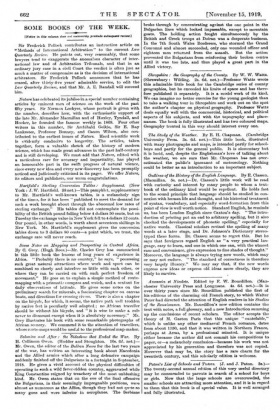Outlines of the History of the English Language. By E.
Classen. (Macmillan. 5s. net.)—Dr. Classen's little work will be read with curiosity and interest by many people to whom a text- book of the ordinary kind would be repellent. He holds fast to the sound principle that language should be studied in con- nexion with human life and thought, and his historical treatment of syntax, vocabulary, and especially word-formation from this point of view is well worth notice. Standard English, he reminds us, has been London English since Caxton's day. "The intro- duction of printing put an end to arbitrary spelling, but it also checked the developments of phonetic spelling," especially for native words. Classical scholars revised the spelling of many words at a later stage, and Dr. Johnson's Dictionary stereo- typed these forms. Dr. Gleason seems to regret this. But he says that foreigners regard English as "a very practical lan- guage, easy to learn, and one in which one can, with the utmost ease and convenience, give expression to fine shades of thought." Moreover, the language is always trying new words, which may or may not endure. "The standard of correctness is therefore• very largely illusory." We may say that if the new words express new ideas or express old ideas more clearly, they are likely to survive.






































 Previous page
Previous page